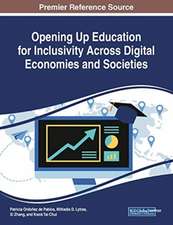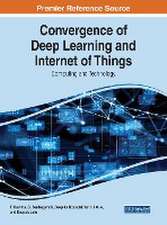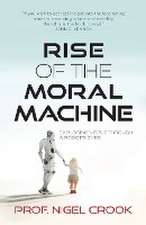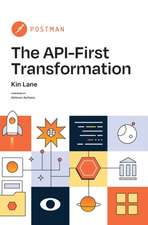Accelerating Strategic Changes for Digital Transformation in the Healthcare Industry: Information Technologies in Healthcare Industry
Editat de Patricia Ordonez de Pablos, XI Zhangen Limba Engleză Paperback – 31 mai 2023
Specially, it pays attention to how information technologies help us in the current global health emergency and the coronavirus epidemic response, gaining more understanding of the new coronavirus and helping to contain the outbreak. In addition, it explores how these new tools and digital health solutions can support the economic and social recovery in the post-pandemic world.
- Discusses best experiences, tools and solutions provided by IT to solve the global disruption caused by the COVID-19 pandemic in societies, healthcare infrastructures and health workers
- Presents case studies with experiences of applications of digital healthcare solutions from around the world
- Encompasses the point of views of renown researchers and academics globally that are working collaboratively to explore new views and frameworks to develop solutions for emergent problems in the healthcare sector
Preț: 734.38 lei
Preț vechi: 1089.46 lei
-33% Nou
Puncte Express: 1102
Preț estimativ în valută:
140.52€ • 146.73$ • 116.04£
140.52€ • 146.73$ • 116.04£
Carte tipărită la comandă
Livrare economică 08-22 aprilie
Livrare express 11-15 martie pentru 184.08 lei
Preluare comenzi: 021 569.72.76
Specificații
ISBN-13: 9780443152993
ISBN-10: 0443152993
Pagini: 424
Dimensiuni: 191 x 235 x 26 mm
Greutate: 0.88 kg
Editura: ELSEVIER SCIENCE
Seria Information Technologies in Healthcare Industry
ISBN-10: 0443152993
Pagini: 424
Dimensiuni: 191 x 235 x 26 mm
Greutate: 0.88 kg
Editura: ELSEVIER SCIENCE
Seria Information Technologies in Healthcare Industry
Public țintă
Graduate students and researchers in medical informatics, healthcare professionals.Policy makers, health IT professionalsCuprins
Section I. The impact of covid-19 in healthcare industry: Challenges and trends
1. Impact of Covid-19 on healthcare in Qatar: Initiation and operations of the Urgent Consultation Centre (UCC) hotline, virtual transformation of healthcare services, and accelerated data sharing solutions - Challenges and opportunities
2. Challenges, innovation opportunities and lessons learned from a prolonged organisational crisis: a case exemplar of the National Health Service Wales
3. Accelerating Pathology Education through Virtual Learning to Address Global Health Needs
Section II. Digital transformation of healthcare services
4. Mobile Health Apps: User's Perception Towards m-Health Apps and Their Adoption Intentions
5. Balancing Patient empowerment and online security considerations from impact of Social Media Promotion of Prescription Drugs: Physician Perception
6. Online health communication during COVID-19 pandemic: A case study of hospitals with social media presence in India
7. Development and usability testing of an air disinfection robot to reduce air clearance times following aerosol generating procedures (AGPs)
Section III. AI and Internet of the Things in healthcare industry
8. Trustworthy Artificial Intelligence in Healthcare
9. Artificial Intelligence based Brain Hemorrhage Detection
10. A systems approach to implementing ethics in a COVID-19 AI application: a qualitative study
11. Automation of depression detection in texts to identify possible cases during COVID-19 pandemic
12. Review of Using Machine Learning in Secure IoT Healthcare
Section IV. Data sharing for accelerating solutions in healthcare industry
13. Health infrastructure, Data sharing and Strategic Changes for Innovative Transformation of Health Services: Evolution of Call Center Patient Appointment Registration for Comprehensive Urology Services in Qatar
14. Heterogeneous Cardiological Data Communication in Telecardiology with Music-Key Generation Scheme
Section V. Health emergency preparedness and response
15. Early warning for emerging infectious disease outbreaks- Digital disease surveillance for public health preparedness and response
Section VI. Conclusions and implications for healthcare research agenda and policy makers
16. Digital Health Policies and Participation for Digital Transformation in the German-speaking Area – A Critical Approach
17. Ethical Dilemmas and Challenges of Digital Mental Health Care
1. Impact of Covid-19 on healthcare in Qatar: Initiation and operations of the Urgent Consultation Centre (UCC) hotline, virtual transformation of healthcare services, and accelerated data sharing solutions - Challenges and opportunities
2. Challenges, innovation opportunities and lessons learned from a prolonged organisational crisis: a case exemplar of the National Health Service Wales
3. Accelerating Pathology Education through Virtual Learning to Address Global Health Needs
Section II. Digital transformation of healthcare services
4. Mobile Health Apps: User's Perception Towards m-Health Apps and Their Adoption Intentions
5. Balancing Patient empowerment and online security considerations from impact of Social Media Promotion of Prescription Drugs: Physician Perception
6. Online health communication during COVID-19 pandemic: A case study of hospitals with social media presence in India
7. Development and usability testing of an air disinfection robot to reduce air clearance times following aerosol generating procedures (AGPs)
Section III. AI and Internet of the Things in healthcare industry
8. Trustworthy Artificial Intelligence in Healthcare
9. Artificial Intelligence based Brain Hemorrhage Detection
10. A systems approach to implementing ethics in a COVID-19 AI application: a qualitative study
11. Automation of depression detection in texts to identify possible cases during COVID-19 pandemic
12. Review of Using Machine Learning in Secure IoT Healthcare
Section IV. Data sharing for accelerating solutions in healthcare industry
13. Health infrastructure, Data sharing and Strategic Changes for Innovative Transformation of Health Services: Evolution of Call Center Patient Appointment Registration for Comprehensive Urology Services in Qatar
14. Heterogeneous Cardiological Data Communication in Telecardiology with Music-Key Generation Scheme
Section V. Health emergency preparedness and response
15. Early warning for emerging infectious disease outbreaks- Digital disease surveillance for public health preparedness and response
Section VI. Conclusions and implications for healthcare research agenda and policy makers
16. Digital Health Policies and Participation for Digital Transformation in the German-speaking Area – A Critical Approach
17. Ethical Dilemmas and Challenges of Digital Mental Health Care























